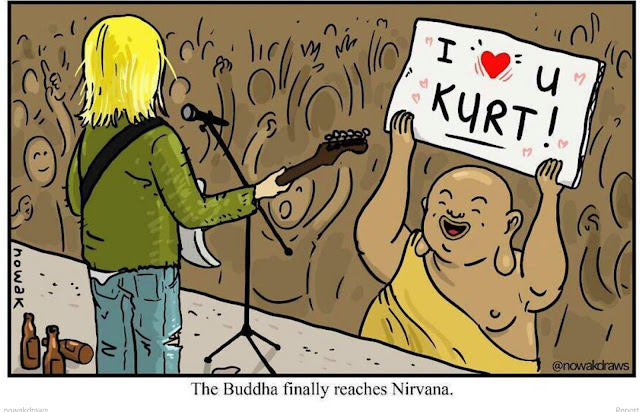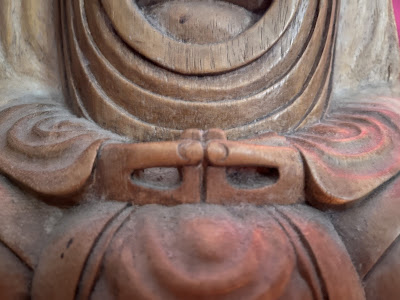I'm not a teacher, not ordained, don't pretend any of those things, I blog as a record of my journey in the hopes it will be useful to others. I want to clarify and express the path to aid my own practice. I like to go from the whole to the parts sometimes and take the larger overview.
Right view and understanding (Samma ditthi): One develops right view based on connection to sangha and fellowship, reading, reflection, meditation and study. The fantasy I have when I think about this is that I could get the right view and then everything would be downhill to attainment, but that's spiritual bypassing, and the truth is that right view is a dog fight, messy, irregular and isn't just an app you can download. Connection with teachers is difficult. Studying the right thing is difficult. Meditating frequently and consistently and in volume is difficult. Fellowship calls for intellectual humility and other personality traits to get along with others, compromise, flexibility and problem solving. There are lots of dead ends, and distractions. Life conditions are not supportive sometimes for developing right view, I need to work to develop better conditions, connections and support. In the combative land of social media, debates about right view can step on people toes. My experience of certain personalities that are more traditional and righteous is that right view can be a kind of theological grounds for calling people less than. You don't have right view, you are less than. You're not even a Buddhist. Obviously they're not supportive and not everyone is sunshine and roses, perhaps a fantasy about Buddhists.
Right thought (Samma sankappa): "Right thought denotes the thoughts of selfless renunciation or detachment, thoughts of love and thoughts of non-violence, which are extended to all beings." (Tricycle) Basically selfish thinking doesn't get you there, power grabs don't get you there, violence doesn't get you there. Ethical conduct is right action (Samma kammanta). Indra's net has jewels that shine and make all the other jewels shine, so all these aspects of the path will reflect off each other. Thinking is part of the path, but it's about the deep wisdom, maturity, sanity and concentrated thinking. There's also an aspect of not reactively grasping at compensatory pleasures, renunciation. It's not sticky generosity, with conditions, it respect the autonomy of others, not trying to manipulate them, and yet skillful means is not being perfect in getting some good lessons and results. Like all theachings that are dialectical and nondual, there will be contradictions, but I think Buddhism is more psychology than philosophy so you are allowed to push people in different directions. Just like all the other steps on the path, you could go on and on about this one. There are stages in the path where discursive unhelpful thinking is discouraged. They're not telling you not to think, just understand if your thinking is in service of neurotic unenlightened goals, which honestly is most of it.
Right speech (Samma vaca). One issue I've struggled with is whether swearing is emotionally truthful, or whether it's too dramatic, and offensive, distracting. I really like to swear. Not a lot but when I was around someone who didn't like swearing I would always say one swear during a conversation. In the age of the internet, you can justify anything and I've read some articles that people who swear are smarter and blah blah blah. Being truthful is very important to me in speech, so people who lie for political or financial gains are not being in harmony. They might feel they are in harmony in trying to resolve some psychic tension based on their selfishness, the desire not to support others and hatred of the free riders. I've learned a lot studying non-violent communication. Marshall Rosenberg created a kind of way of looking at how to communicate. You describe what you see, say how it makes you feel, express an emotional need, and make a request. I love the list of emotional needs. I got stuck on separating wants from needs, but emotional needs are to belong or feel safe, so it's not materialistic. Belonging is a need. I'm sure I could get better at communicating, I've always felt like people need to give me the benefit of the doubt, and that's just my laziness in needing to communicate better. I would also add that fighting isn't necessarily disharmony, it's more harmonizing not to hide.
Right action (Samma kammanta). The ten precepts are great guidelines but there are lots of things to consider in ethics. For me being a kind positive ethical person supports fellowship, study, devotion and meditation. On the one hand I don't think you should be so precious about accidentally killing insects. On the other hand, there can be some amazing growth through ethical reflection about your impact on others. For me ethical thinking as led to veganism, and other practices. I think it's important to vote in a democracy, and educate yourself so that you're an intelligent voter. Supposedly plastic recycling isn't great, but other aspects of thinking about the environment are important. I've become interested in effective altruism.
Right livelihood (Samma ajiva). On the continuum on the one end you have illegal drug industry, butchers, arms salesmen and hitmen. Selling alcohol and legal drug business wouldn't be consider useful to others to gain insight. On the other end you have a monk. In my case, I have children so I need to care for them and be responsible. I've done a million jobs but I felt most supportive of others when I was a teacher and when I was a psychotherapist.
Right effort (Samma vayama). To progress on the path you're going to have to extend effort, mental energy, and not always gratify oneself with whatever, Netflix. The lute story is about a guy whose feet got all bloody from walking a lot, and you need to push hard, but not go crazy. Like tuning an instrument. Finding your natural exertion in the spiritual life is part of the journey. Right effort is about trying to right the ship and fighting off unhelpful mental states.
Right mindfulness (Samma sati). So what can you be mindful about? The Buddhist tradition tells you what to focus on. They tell you to focus on your body, feelings, consciousness and the Dharma (5 fetters, 5 skandhas, fetters, factors of awakening, 4 noble truths).
Right concentration (Samma samadhi): Wikipedia says, practicing meditation "which includes samadhi proper in the second stage, and reinforces the development of the bojjhagā, culminating into upekkha (equanimity) and mindfulness." This is about getting into the proper meditative states, and progressing in meditation. Notice this is the last step, and perhaps a meditation focused path might neglect the other aspects of the path. I always think about that sutra that lists the things to do to prepare yourself to be able to meditate a lot. And also carving out the space for retreat.
Links to Wikipedia articles and sources from Pali Canon:
The Longer Discourse to Saccaka (Source)
Setting the Wheel of Dhamma in Motion (source)
The Great Discourse on the Buddha’s Extinguishment (source)



















